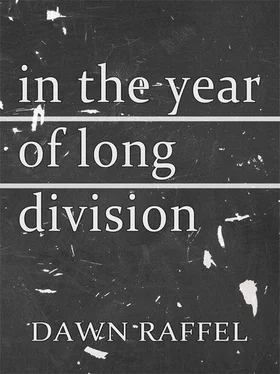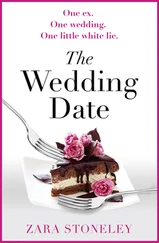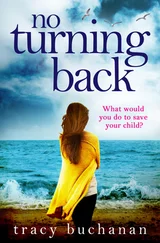We would be a fat-tongued gaggle, looking at the sparkle in cement. We would be burnt-nosed, flat feet thonged. We would be thick into shrubs, cross, scratchy in the burrs.
We saw wheels. Spokes and pleats were what we saw, the carriage’s ribs, her looking in — in and in. She would be touching the hood of the carriage, touching crushed net. She would be moving her lips or else looking at us: a sticky and streaky, scab-kneed clan — G’s all jam on the fingers, shirttails, somebody chewing on a braid, BG not much but ears, and minus teeth, three hipless J’s, each in the next J up’s old last year’s clothes, Peggy in the middle with the asthma, picked-on, C and I our own can’t-pry-us-apart, don’t-try-it selves. Or could have been she didn’t even know us.
Her eyes were pale, and she had pale lank hair, pale lips, the palest of voices.
What did she utter? We did not hear.
We had never heard crying from deep in the carriage.
WE had heard it had a heart.
(How could it not?)
MOTHER and the mothers would stand in heat to knock at the storm-doored door, fixing their faces, smoothing their hair in the smeared, distorting glass. They carried covered dishes: small foods, creamed to soothe — peas, corn; sweet pie steaming through a forked crust; loaves and loaves wrapped up in shine.
Mother brought a spoon. Mrs. G brought an animal, bright-eyed, stuffed; a musical mobile of fat-finned and fat-tailed creatures of the water.
Mrs. M brought a son. He was a junior version of Senior, always appearing to be chewing something used. He was there to weed, his mother said. He would help to prune, she said, and dump.
Declined.
No one brought a thing conforming to the body — darlingly footed, tenderly cowled — nothing blushingly pink or baby blue.
HOW could they not? It was impossible not to, really: They compared — sitting on stoops, perspired in kitchens, stirring, pouring — the mothers did — over the clotheslines—“What did you see?”—engaging the sprinklers—“She said what?”—wiping a nose, a blotchy cheek, changing the babies—“You?” “You?”
It was, for us, a humming. We were busy as mothers, C and I. Screens banged. Pops dripped. Rules were set, according to the ordinary governance of children — tap, tap, rotten egg and last one in; a dare, a threat — and always leaving Peggy wheezing (balled-up face enraged).
The shame of it, the mothers said. That we heard. That was clear. Not a minute in the nursery of those sad R’s. Not a coffee in the kitchen, a peek in the hall. And on the doors, the mothers said, storm glass still.
“No breeze,” said Mother, anchoring pigtails. “Not a lick,” she said, “of air, and it so hot. Dank.”
“That blinding smell,” said Mrs G. “Ideas?”
There were ideas.
There were serious pieces of mind.
“The woman,” Mrs. M said, “has my pretty tray.”
“My bowl,” Mrs. G said. “Not that it hurts me.”
Someone was screaming.
“If I were Mrs. R,” Mrs. J said.
Someone was howling.
“Stop right now,” Mrs. M said. “Someone could lose the use of an eye.”
“If you were her,” Mother said.
“Do you want to be punished?” Mrs. M said.
“If,” Mother said.
“Well,” Mrs. J said, “I just can’t think what, if you know what I mean.”
THE nurses knew. They were openly privy to the what was what. “No damage to the lungs,” the soft nurse said. “Nothing the matter with the wind,” she said. “It breathes,” she said. She’d had it all firsthand: She was dating a doctor. The pocked nurse supposedly told Mr. next-door M, Mother said, the trouble was, it lived.
“PATIENCE of a saint,” Mother said.
Our street smelled mowed.
“ He is like to drink,” Mrs. J said to Mother.
“Someone is listening,” Mother said.
Peggy was pinned.
Mrs. J was cutting piping. Her spools were on the stoop. She was making a frock, its one-of-a-kindness some kind of consolation for Peggy. (“And where will Peggy wear it?” Mother had said.)
“The shame of it,” Mrs. J said. “Out all night, he is,” she said. “Think of it.”
(I thought of it — a man, not our father, in the night, in the night-lit glow of smeary rooms, nakedly smoking.)
“Ladies,” Mother said.
C was scratching. Peggy coughed. I was peeling skin. We were bitten and reddened from the long, oiled days; spare nights pitched-tented in the side yards, spooking Peggy, parched.
Our breathing grew ragged.
“Count your blessings,” Mother said.
Hood, pleat, rib, rib — we were gawking witnesses.
“The shame,” Mrs. J said.
For there it was: Mrs. R was laboring — crack, crack — doubling almost over the terrible carriage’s terrible cargo.
I DID not see the candles. I did not see the gown. I did not see the priest. I did not see the long black car in the light of the morning. I did not see Mother. I did not see the fingers of my sister, digging — nails in the heat of my flesh. I did not see the earth. I did not see the marks. I was playing blind, eyes covered with linen, the day they buried Peggy.
MUST we continue? Summer continued. (“No one could help it,” the soft nurse said, speaking of Peggy. “Better off,” the pocked nurse said. “Don’t you think?”) The mothers baked. Sweetly, and ever so gently, Mrs. G inquired as to Peggy’s piped frock, which frock, as it happened, Peggy was wearing wherever Peggy was. They had closed the box.
“There must be a reason,” Mother said.
“There will be an angel,” the soft nurse said.
“There will be roses,” the pocked nurse said, “with plenty of thorns.”
Roses there were: thorny, snitched. Someone, it seemed, was stealing from the gardens of our street. Willy-nilly. Violets shabby and rotting, limp petunias, daisies bald as “loves-me-not,” the weekend blooms of Mr. M, dog-eared stalks and watered ragweed — rank and flung they lay, weeping and stinking on the stoop of the bereaved.
“Why, why, why?” Mrs. J said. “There is no sense.”
Someone, the mothers agreed, with an unfit mind was darting about in the dead of the night.
Days grew shorter. Days-old bread appeared. Flat cake, greenish biscuits — ugly. “Why in the world?” said Mrs. J, dressed in black, her face pinched. She would not bend. She would not pick these up, these ugly things, untouchable, delivered to the very stoop of her house.
“What else?” Mother said. “What in the wide world else will the woman have to suffer?”
This: the heaping plate outside her door, identified as something belonging to Mother.
THERE was a mystery here: The carriage was missing.
“Bite your tongue,” C said.
Nobody answered the storm-doored door. The mothers knocked. Mrs. M took to kicking.
What had Mother not got back? the mothers said.
“My bowl,” Mrs. G said. “Not that I notice.”
Day leaked into day leaked into day, and no one saw it — pleat nor rib, bulging hood. (The more the unseeable thing was not seen on our street, the more I nearly saw it: a speck in my eye, a flicker, there in our yard, there in our house, a tightness down in my throat, and there in our room, a shadow.)
Oh, I was tired, yawning.
“Seal your lips,” my sister said.
“What did she see?” I wanted to know.
Why, the soft nurse might have said, had Peggy, according to a certain dated doctor, run? What was Peggy doing in the dark, alone, where she had been found?
(I am afraid to think, still, of what the pocked nurse might have said.)
“Who shut the windows?” Mother said.
“What did she see?” I said to my sister.
Night leaked into night.
“Not healthy,” Mother said.
Читать дальше












